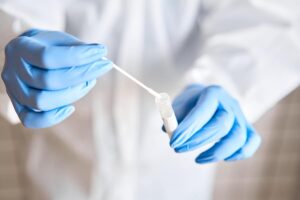
What if there was a magic test that could tell you every single disease or health condition you would get in your lifetime? All it would take would be a blood test or cheek swab for you to learn if you’d get Alzheimer’s disease, suffer a heart attack or even become addicted to alcohol or drugs.
If a life-altering test like this existed, would you take it?
While such a test doesn’t actually exist today, this is where science appears to be headed in the future. One area of study where this has become more of a reality is genetic testing for addiction.
What is Genetic Testing for Addiction?
Genetic testing, also known as DNA testing, identifies and examines changes in DNA and chromosomal sequences within the human genome. If you study any two random people for genetic study , 99.9 percent of their human genome will be exactly the same. It’s that remaining 0.1 percent variation that can indicate if an individual is at risk of alcohol or drug addiction.
In other words, genetic testing is the closest we can get to truly telling someone their fortune – in regard to their likelihood of developing a substance addiction, that is.
What Genetic Testing is Able to Tell Us about Addiction
Before diving into what we currently know about addiction from genetic testing, it’s important to keep in mind that genetics aren’t the only reason why you may be struggling with a substance abuse disorder, while a sibling or friend is not.
Environmental factors like trauma , stressful life events and even who you choose to spend your time with can all influence whether or not you drink or abuse drugs. However, research shows that a person’s genes can account for anywhere between 40 to 60 percent of that individual’s predisposition to alcohol or drug addiction.
So, here’s what genetic testing is currently able to tell us about addiction:
- We Know Certain Genes are Involved with Certain Addictions. Genetic study has advanced so much that we are able to say, with some level of accuracy, that certain genes are involved with specific types of addictions. For example, we now know that the A1 allele of “DRD2”, a dopamine receptor gene, is found more often in people who struggle with alcohol or cocaine abuse. We also know that people with lower levels of the CHRNA2 gene may be more likely to develop a cannabis use disorder.
- Genes Evolve and Change Over Time. Epigenetics research has found that genes, themselves, can change and evolve over time. This can make pinpointing specific genes involved with addiction more difficult than it already is. That doesn’t take away from the findings we already have, but it does tell us that we still have a lot to learn about how genetics can influence addictive vulnerabilities.
- Genetic Testing for Addiction is Still a Work in Progress. All science and discoveries come with limitations. For example, researchers at the Indiana University School of Medicine published research in 2014 that revealed 11 genes that could help predict the likelihood of an individual becoming addicted to alcohol or not. However, the researchers involved acknowledged limitations to the study and that their findings couldn’t serve as precise evaluations for everyone.
- Just Because You’re Higher Risk, Doesn’t Mean You Become Addicted. Just because someone has the A1 allele of the DRD2 gene doesn’t automatically mean they’ll struggle with alcohol or cocaine addiction at some point in their life. Your environment still plays a crucial role in whether or not you abuse alcohol or drugs. If you suffer trauma or experience intense levels of stress, these environmental factors combined with the genes associated with addiction may trigger you to participate in destructive behaviors like drinking or getting high.
As beneficial as genetic testing is and will be at determining who is more predisposed to addiction, genetic testing may also be able to aid addiction treatment.
For example, medication-assisted treatment is a useful tool to help people overcome substance abuse. Since not everyone responds to medications the same way, genetic testing for addiction may be able to help medical professionals determine what medications are best for addiction treatment based on how an individual’s genetic makeup will make them respond.
Genetic testing offers a lot of promise in the study and treatment of addiction. However, if you’re currently struggling with substance abuse, the best solution for you now is to seek help from a treatment center like The Raleigh House.
Heal Your Mind, Body and Spirit at The Raleigh House
With over 10 years of addiction treatment experience, we know how to help you find long-term sobriety. Our addiction treatment approach is based on a solid foundation of science, understanding how addiction changes the brain and evidence-based treatments.
We leverage therapies and treatments designed to help your brain heal from substance abuse and teach you new habits and coping mechanisms, so you can better manage stress, trauma and other triggers that led you down the path of addiction in the first place.
If you’re ready to find lasting recovery from addiction, don’t wait another minute. Contact our admissions team today to learn how to get started.
